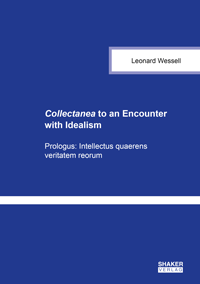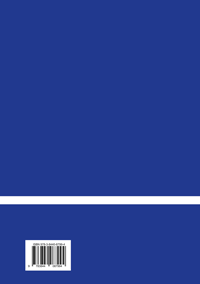
Shop : Details
Shop
Details
19,80 €ISBN 978-3-8440-8799-4Softcover144 pages213 g21 x 14,8 cmEnglishReference book
October 2022
Leonard Wessell
Collectanea to an Encounter with Idealism
Prologus: Intellectus quaerens veritatem reorum
As the title suggests, this book consists of a collection of four articles by the author printed between 2009 and 2020 and an original addendum-chapter. Relative to the thematic diversity in their thematic unity, each article is sufficient unto itself. However, all the articles reflect the metaphysical stance of the author, which is that of idealism., becoming thereby encounters with idealism. Wolfgang Stegmüller has capsulized the nature of idealism in the following manner. “Idealism [in opposition to realism] equates being (Sein) with the being of the mind (Geist), ascribes to the subject preference to the objective, ascribes true reality [Wirklichkeit] to the being (Sein) of the idea”. The chapters are organized around Stegmüller’s précis. The first chapter takes up the problem of free will in terms of free (viz., freely functioning) reason. Without free will, it is argued, there is no free reason, i.e., reason cannot follow its own canon of rationality, meaning that it is not dictated to by an external, decreeing factor, e.g., the brain, instead its own formative logic. The argument is accomplished by showing the internal contradiction in the materialist Sam Harris’ diatribe against free will, a contradiction that renders his own theorizing null and void, if true. In contrast, the author argues in agreement with Bernard Lonergan, SJ that the human mind possesses a genuinely autonomous “desire to know” – a desire that weaves its way through the study at hand. The second chapter treats the problematic of truth, but not by seeking to establish what truth is, rather to determine where truth (ontologically) is, once claimed as possessed by the mind of the knowing subject. In other words, the thematic focus is concerned with the very being of truth (esse vertatis) and is presented in opposition to the denial of (objective) truth by Richard Rorty. In the third chapter the conceptualization, no, actually two methods of conceptualizing infinity are considered. Historically, the concept of infinity is derived by a method of extrapolation, i.e., 1, 2, 3, … ∞. All considerations of infinity end in paradoxes, even that of Georg Cantor’s efforts did not resolve. The central paradox, wittily stated by Pierre Dac, is: “L’infini, c’est long, surtout vers la fin” / “Infinity is long, especially towards the end” of the series where it should be “short”. In other words, no number of the augmenting series gets even one unit closer to infinity than any other number, i.e., each and every number remain equally infinitely distant. Hence, Dac’s contrast between long and short. This fundamental paradox remains unresolved. A second method of conceptualizing entails not focusing upon the series as it leads onwards towards infinity, rather upon infinity (∞) itself, whereby all finitude is excluded from the conceptualization. In other words, reflection upon infinity is realized by means of an exclusionary method. This is carried out in terms of Nicholas Cusa’s seemingly paradoxical “docta ignorantia ineffablile positiva” / “instructed positive ignorance of the ineffable”, whereby contradictions structuring paradoxes of infinity yare resolved as the coincidentia oppositorum / coincidence of opposites. Some truly interesting, if not startling coincidences are examined. In the fourth chapter, the ontological argument, particularly as developed by Josiah Royce, is presented. i.e., the standard realist doctrine of the independence as the ontological mark of the object, of the known, is established and critiqued as failure, leaving the path open to Royce’s idealism. In this chapter, the limits of Stegmüller’s contention of idealism become evident. The ontological argument as pursued by Royce locates the critical foundation of his argument, not in the mind, viz., human mentality as defining idealism, rather in consciousness per se, infinite consciousness. The realist is challenged to conceptualize, even to imagine, any object as such in its very independence of consciousness, an attempted realization, were it successful, is its own refutation. A fifth chapter has been added as an addendum that, building upon Royce’s ontological argument, presents the presuppositions of idealism as understood by the author. In other words, the idealist standpoint which is implicit in the generation and formulation of the articles collected becomes scrutinized as a reflection of the unity of the theoretical stance that generated them. In the process the author’s own idealism receives an explication. The author associates himself with the absolute idealism of Anglo-American philosophers, such as Josiah Royce (American) and F. H. Bradly (British). In addition, the author’s integration of the ontological idealist, Robert Reininger (Austrian) is introduced. The nature of ontological idealism, however, will be the subject of a subsequent study.
Keywords: Free Will; Free Reason; Infinity; Josiah Royce; Ontological Argument
Available online documents for this title
You need Adobe Reader, to view these files. Here you will find a little help and information for downloading the PDF files.
Please note that the online documents cannot be printed or edited.
Please also see further information at: Help and Information.
Please also see further information at: Help and Information.
| Document |  | Document | ||
| Type |  | |||
| Costs |  | 14,85 € | ||
| Action |  | Purchase in obligation and download the file | ||
| Document |  | Table of contents | ||
| Type |  | |||
| Costs |  | free | ||
| Action |  | Download the file | ||
User settings for registered online customers (online documents)
You can change your address details here and access documents you have already ordered.
User
Not logged in
Export of bibliographic data
Shaker Verlag GmbH
Am Langen Graben 15a
52353 Düren
Germany
Am Langen Graben 15a
52353 Düren
Germany
Mon. - Thurs. 8:00 a.m. to 4:00 p.m.
Fri. 8:00 a.m. to 3:00 p.m.
Fri. 8:00 a.m. to 3:00 p.m.
Contact us. We will be happy to help you.



